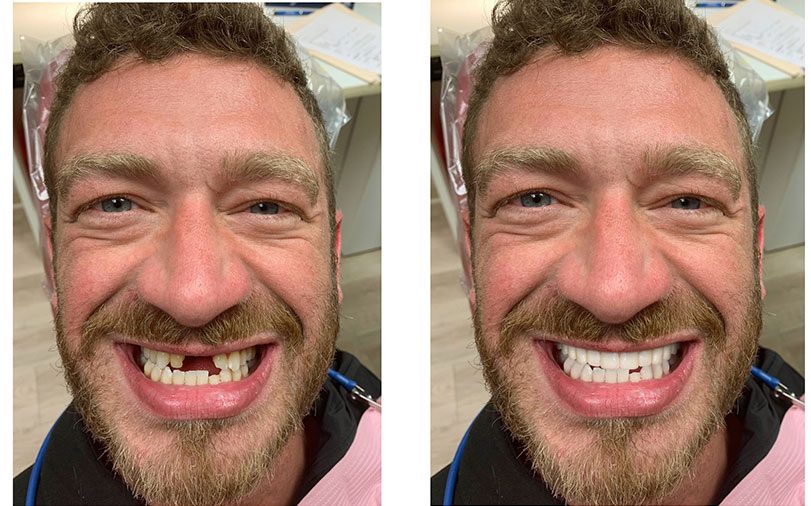Find Out If Dental Implants Are Right for You in Bingham Farms, MI
 Tooth loss can affect how you eat, speak, and feel about your smile. Fortunately, dental implants in Bingham Farms, MI offer a permanent solution that restores both function and appearance. At Smile Creator, our Bingham Farms implant dentist, Dr. Timothy Kosinski provides advanced implant dentistry for patients from Bingham Farms, Franklin, Beverly Hills, Birmingham, Southfield, and nearby areas.
Tooth loss can affect how you eat, speak, and feel about your smile. Fortunately, dental implants in Bingham Farms, MI offer a permanent solution that restores both function and appearance. At Smile Creator, our Bingham Farms implant dentist, Dr. Timothy Kosinski provides advanced implant dentistry for patients from Bingham Farms, Franklin, Beverly Hills, Birmingham, Southfield, and nearby areas.
If you are looking for the best dentist near you to replace missing teeth, understanding whether you are a candidate for implants is the first step toward a healthier, more confident smile. Schedule a consultation at our Bingham Farms dental office by calling (248) 646-8651 to find out if you qualify for dental implants.
Top Care from Our Implant Dentist in Bingham Farms
At Smile Creator, patients receive personalized care from a trusted leader in implant dentistry. Dr. Timothy Kosinski is a Diplomate of the American Board of Oral Implantology/Implant Dentistry, the International Congress of Oral Implantologists, and the American Society of Osseointegration.
Patients appreciate his compassionate approach and expertise. Karen B. shares her experience:
- “I would recommend Dr. Kosinski and his staff to take care of all your dental needs. I had an implant done a few years ago, he explained everything and made me very comfortable with my decision to go ahead with the implant. He is a very kind and caring person, I give him 5 stars plus.”
With a reputation for excellence, Smile Creator is the home of the best dentist near you for implant dentistry in Bingham Farms.
Who Is a Candidate for Dental Implants?
You may be a candidate for dental implants if you meet the following conditions:
- You are missing one or more teeth
- You have healthy gums without signs of active periodontal disease
- Your jawbone is strong enough to support an implant or you are open to supplemental procedures if needed
- You are in good general health without uncontrolled medical issues
- You are a non-smoker or willing to stop smoking during treatment
If you meet these requirements, our experienced implant dentist in Bingham Farms, MI can guide you through the process.

Supplemental Procedures to Support Dental Implant Success
Some patients may not be immediate candidates for dental implants, but that does not mean implants are out of reach. Smile Creator offers supplemental procedures that can help prepare your mouth for long-lasting success, including:
- Bone Grafting: Adds bone tissue to areas where the jaw is too thin or weak to hold an implant.
- Sinus Lift: Elevates the sinus floor and creates room for additional bone in the upper jaw.
- Gum Disease Treatment: Ensures the gums are healthy and free from infection before placing implants.
- Tooth Extractions: Removes damaged or decayed teeth that need to be replaced with implants.
These treatments allow more patients to become candidates for implants and enjoy the benefits of a complete smile.
Alternative Dental Solutions at Smile Creator in Bingham Farms
 Not every patient is an ideal candidate for dental implants due to factors like insufficient bone density, gum disease, or certain medical conditions. Fortunately, at Smile Creator, Dr. Kosinski offers several alternative dental solutions to restore your smile and maintain oral health.
Not every patient is an ideal candidate for dental implants due to factors like insufficient bone density, gum disease, or certain medical conditions. Fortunately, at Smile Creator, Dr. Kosinski offers several alternative dental solutions to restore your smile and maintain oral health.
- Traditional Dentures: Removable dentures can replace full or partial sets of teeth. Modern dentures are designed for comfort and natural appearance.
- Implant-Supported Dentures: For patients who cannot have standard implants, mini implants or fewer strategically placed implants can stabilize dentures for better function and comfort.
- Dental Bridges: Bridges use existing healthy teeth to support replacement teeth. They are an effective way to fill gaps when implants are not an option.
- Partial Dentures: For patients missing only a few teeth, partial dentures can restore function and aesthetics without surgery.
These alternatives ensure that patients in Bingham Farms, Franklin, Beverly Hills, Birmingham, and Southfield can maintain a healthy, functional smile even if dental implants are not suitable. Dr. Kosinski works closely with each patient to recommend the best solution based on their oral health, lifestyle, and preferences.
Frequently Asked Questions
If I have dentures, can I upgrade to dental implants?
In most cases, yes! Quite a few of our patients have shown interest in upgrading from dentures to dental implants. Implant-supported dentures offer the best of both worlds, combining the convenience of dentures with the stability and long-term health benefits of implants. If you’ve suffered from bone loss in your jaw or if you have gum disease, a supplemental procedure can prepare you for implant placement.
If I have gum disease, can I still get dental implants?
Healthy gums are crucial to the success of your implants, so patients with gum disease won’t be able to immediately qualify for the procedure. Thankfully, our dentists offer a variety of treatments to eliminate gum infections and restore the health of your smile. Once your gums are free of bacteria, you’ll be ready for implant placement.
Determine Your Candidacy For Dental Implants at Our Bingham Farms Dental Office Today!
If you are wondering whether you qualify for dental implants in Bingham Farms, MI, the best step is to schedule a consultation with Dr. Timothy Kosinski at Smile Creator. With advanced training and years of experience, he can evaluate your needs and design a treatment plan that restores your confidence and oral health.
Contact the best implant dentist in Bingham Farms, MI by calling (248) 646-8651 to schedule your consultation and discover why patients throughout Bingham Farms, Franklin, Beverly Hills, Birmingham, and Southfield trust Dr. Kosinski for dental implants.
